Synapomorphy - Study guides, Class notes & Summaries
Looking for the best study guides, study notes and summaries about Synapomorphy? On this page you'll find 88 study documents about Synapomorphy.
Page 4 out of 88 results
Sort by
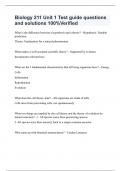
-
Biology 211 Unit 1 Test guide questions and solutions 100%Verified
- Exam (elaborations) • 13 pages • 2024
-
Available in package deal
-
- $15.49
- + learn more
What is the difference between a hypothesis and a theory? - Hypothesis: Testable prediction Theory: Explanation for a natural phenomenon What makes a well-accepted scientific theory? - Supported by evidence Incorporates relevant laws What are the 5 fundamental characteristics that all living organisms have? - Energy Cells Information Reproduction Evolution What does the cell theory state? - All organisms are made of cells Cells arise from preexisting cells, not spontaneously W...
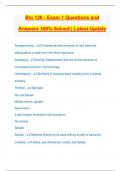
-
Bio 120 - Exam 1 Questions and Answers 100% Solved | Latest Update
- Exam (elaborations) • 42 pages • 2024
-
- $9.99
- + learn more
Bio 120 - Exam 1 Questions and Answers 100% Solved | Latest Update Synapomorphy - A shared derived character or trait state that distinguishes a clade from the other organisms. Analagous - Having characteristics that are similar because of convergent evolution, not homology. Homologous - Similarity in characteristics resulting from a shared ancestry. Porifera - Sponges No true tissues Mostly marine, aquatic Asymmetric 2 germ layers (endoderm and ectoderm) No coelom Sessile Sessile...
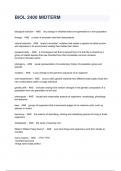
-
BIOL 2400 MIDTERM EXAM QUESTIONS AND ANSWERS
- Exam (elaborations) • 7 pages • 2023
- Available in package deal
-
- $9.99
- + learn more
BIOL 2400 MIDTERM EXAM QUESTIONS AND ANSWERS biological evolution - ANS any change in inherited traits over generations in one population lineage - ANS a chain of ancestors and their descendants natural selection - ANS leads to evolution, mutation that enable a species to bettie survive and reproduce in its environment making them better then others synapomorphy - ANS a homologous trait that is derived form of a trait the is shared by a group of related species that ...
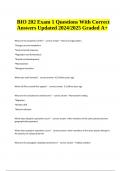
-
BIO 202 Exam 1 Questions With Correct Answers, Latest Updated 2024/2025 Graded A+
- Exam (elaborations) • 15 pages • 2024
-
Available in package deal
-
- $13.49
- + learn more
What are the properties of life? - correct answer *Cells and organization *Energy use and metabolism *Environmental response *Regulation and homeostasis *Growth and development *Reproduction *Biological evolution When was earth formed? - correct answer 4.55 billion years ago When did life on earth first appear? - correct answer 3.5 billion years ago What are the evolutionary mechanisms? - correct answer *Nonrandom mating *Migration *Genetic drift *Natural selection When does allopat...
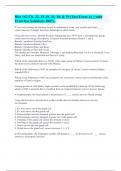
-
Bisc 162 Ch. 22, 25-29, 34, 38, & 39 (Test Form A) || with Errorless Solutions 100%.
- Exam (elaborations) • 4 pages • 2024
-
Available in package deal
-
- $10.39
- + learn more
If you were looking for dinosaur fossils in sedimentary rocks, you would expect that ____. correct answers Younger fossils are found above older fossils. Using the trees, below, identify the gray shading that does NOT show a monophyletic group. correct answers Image Description: Common Ancestor produces Branch 1 and 2. Branch 1 produces Horsetail and Fern. Branch 2 produces Branch 3 & 4. Branch 3 produces Daisy and Rose. Branch 4 produces Pine and Cycad. The shaded area includes Branch...

-
BIOL 180 Quiz 2 2023/24 100% Correct
- Exam (elaborations) • 23 pages • 2023
-
Available in package deal
-
- $15.49
- + learn more
BIOL 180 Quiz 2 2023/24 100% CorrectBIOL 180 Quiz 2 2023/24 100% Correct Return to Assessment List Part 1 of 5 - Chapter 2 42.0 Points Question 1 of 33 3.0 Points A bond between two atoms that occurs frequently, but does not require much energy to break is referred to as what? • A. Covalent bond • B. van der Waals Interactions • C. Hydrogen bond • D. Ionic bond Feedback: Great job. Question 2 of 33 3.0 Points What is the smallest component of...

-
BIOL 180 Quiz 2 2023/24 100% Correct
- Exam (elaborations) • 23 pages • 2023
-
Available in package deal
-
- $17.99
- + learn more
BIOL 180 Quiz 2 2023/24 100% CorrectBIOL 180 Quiz 2 2023/24 100% Correct Return to Assessment List Part 1 of 5 - Chapter 2 42.0 Points Question 1 of 33 3.0 Points A bond between two atoms that occurs frequently, but does not require much energy to break is referred to as what? • A. Covalent bond • B. van der Waals Interactions • C. Hydrogen bond • D. Ionic bond Feedback: Great job. Question 2 of 33 3.0 Points What is the smallest component of...
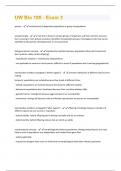
-
UW Bio 180 - Exam 3 questions and answers graded A+
- Exam (elaborations) • 7 pages • 2024
- Available in package deal
-
- $9.99
- + learn more
species - evolutionarily independent population or group of populations synapomorphy - a trait that is found in certain groups of organisms and their common ancestor, but is missing in more distant ancestors; identifies monophyletic groups; homologous traits that can be identified at the genetic, developmental, or structural level biological species concept - reproductive isolation between populations (they don't breed and don't produce viable, fertile offspring) - reproductive isolation...

-
Bio 335 Lab Midterm Exam -Questions with Correct Answers/ 100% Pass/ Latest Update
- Exam (elaborations) • 31 pages • 2024
- Available in package deal
-
- $10.49
- + learn more
Pacific Hagfish ORDER MYXINIFORMES • Gill pouches may open separately to outside, or by a common opening. • Sensory barbels on nostrils and mouth. • Single nostril opens into mouth, unlike that of lampreys. Water can enter the pharynx through the-nostril as well as the mouth. • Rudimentary eyes (lampreys have well-developed eyes). • One semicircular canal in inner ear (a synapomorphy for the group). • No paired fins, no dorsal or anal fin (although there is a dorsal and anal ...
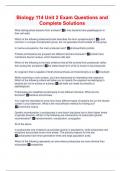
-
Biology 114 Unit 2 Exam Questions and Complete Solutions
- Exam (elaborations) • 4 pages • 2024
-
Available in package deal
-
- $8.99
- + learn more
What distinguishes bacteria from archaea? d only bacteria have peptidoglycan in their cell walls Which of the following statements best describes the term synapomorphy? a trait common in a single monophyletic group, but not generally found outside of that group In marine ecosystems, the main producers are? photosynthetic protists Protists and bacteria are grouped into different domains because? protists have membrane bound nucleus, which bacteria cells lack Which of the following is the best...

How did he do that? By selling his study resources on Stuvia. Try it yourself! Discover all about earning on Stuvia


